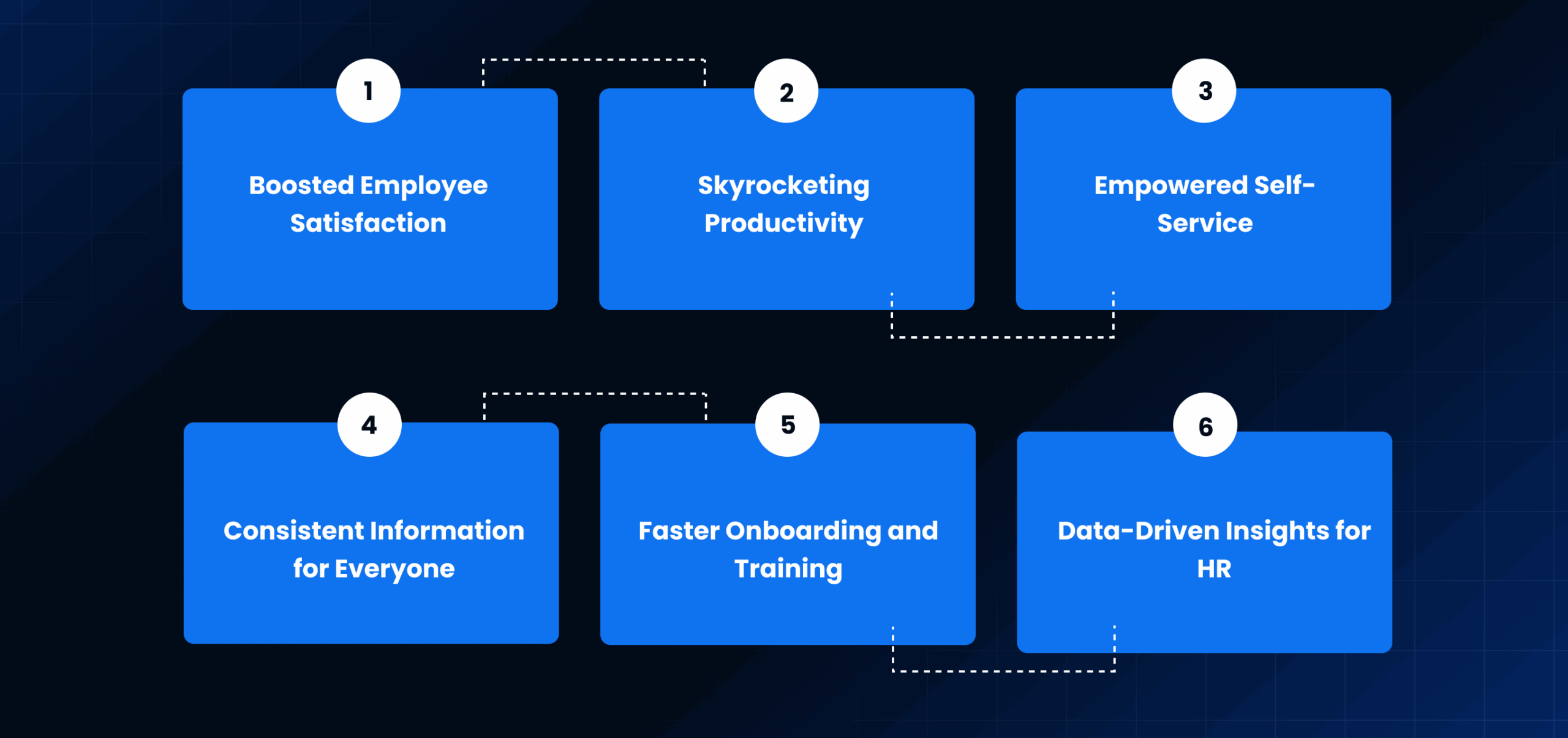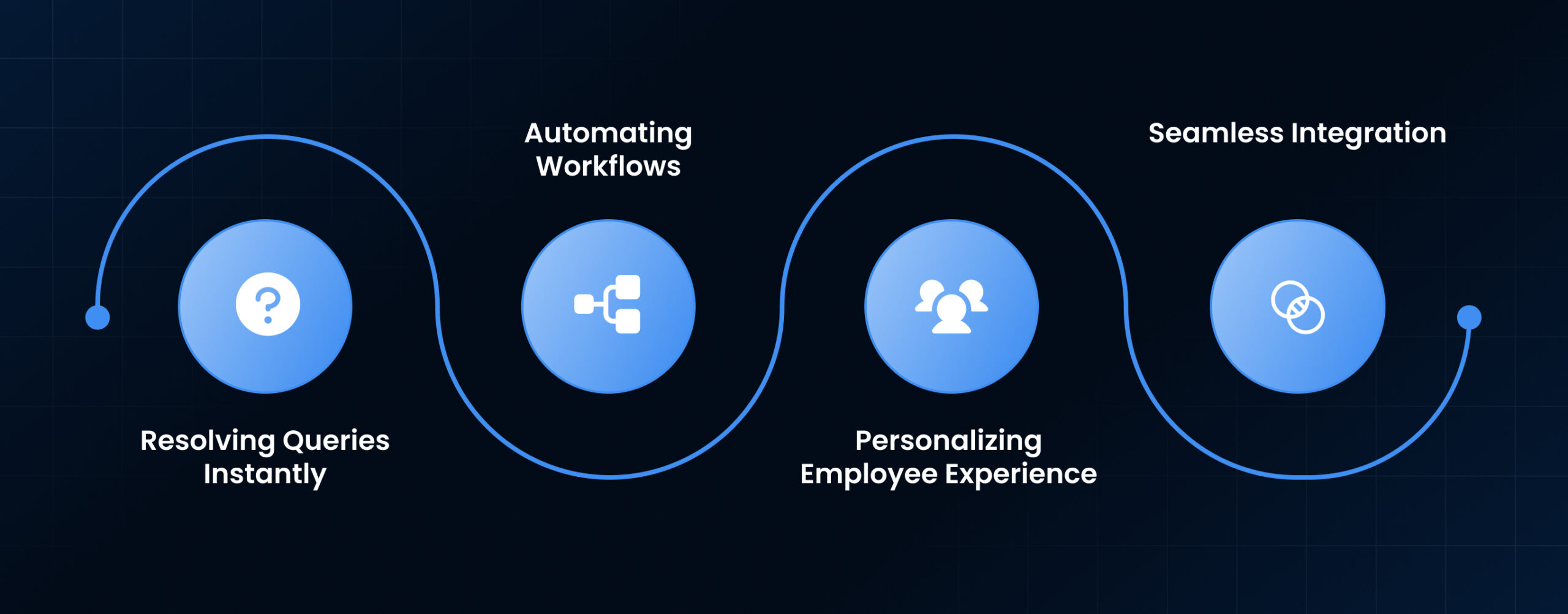Introduction
As a Head of HR or Chief People Officer, your focus is unwavering: to cultivate a thriving workplace where every employee feels supported, productive, and valued. You’re constantly seeking ways to enhance their daily experience, streamline operations, and ultimately, drive the success of your entire organization. In today’s fast-paced world, one powerful ally is emerging as a game-changer: AI knowledge management.
This isn’t just another tech trend; it’s a fundamental shift in how we empower our teams by putting answers right at their fingertips. Imagine a world where searching for information is no longer a chore, but an effortless interaction. This is the promise of AI knowledge management.
What is AI Knowledge Management?
At its heart, AI knowledge management is about making all the valuable information within your company incredibly easy for your people to find and use. Think of it as having an incredibly smart, tireless assistant who knows everything about your company , from the nuances of your benefits plan to the steps for submitting an IT request, or even the latest company expense policy. This assistant doesn’t just store information; it understands it, organizes it, and delivers it precisely when and where your employees need it.
Instead of hunting through outdated documents, various internal websites, or waiting for a colleague to respond, your team interacts with an intelligent system. This system leverages artificial intelligence to comprehend their questions, no matter how they’re phrased, and provides instant, accurate answers. Ultimately, it’s about transforming how your people access the collective wisdom of your organization.
How AI Knowledge Management Works
The magic of AI knowledge management truly shines in its operational flow. First, it involves gathering all your company’s information , every policy document, frequently asked question, IT troubleshooting guide, and HR guideline , from all corners of your enterprise. This data is then fed into an AI system.
Next, the AI “learns” from this data. It uses sophisticated algorithms to understand the content, identify relationships between different pieces of information, and even recognize common patterns in how employees ask questions. When an employee has a query, they simply type or speak their question into the system. The AI then processes this request, comparing it against its vast knowledge base. Crucially, it doesn’t just do a keyword match; it understands the intent behind the question. For instance, if someone asks, “How do I take time off for my kid’s soccer game?”, the AI understands they’re looking for information on requesting leave, not just anything about “kids” or “soccer.”
Finally, the system delivers the most accurate and relevant answer directly to the employee, often in a conversational style. This immediate, personalized response ensures your employees get what they need, without delay or frustration. This continuous learning process also means the system gets smarter over time, constantly improving its ability to serve your team.
Key Benefits of AI Knowledge Management
For any Chief People Officer, the advantages of embracing AI knowledge management are significant, directly impacting your most critical priorities:
- Boosted Employee Satisfaction: Nothing is more frustrating than not being able to find answers. When employees get immediate, accurate help for their questions about pay, benefits, software issues, or company policies, their job satisfaction soars. This instant gratification signals to your team that their time is respected and their needs are a priority.
- Skyrocketing Productivity: Time spent searching for answers is time lost from core responsibilities. By providing quick access to information, your employees can resolve their own issues rapidly and get back to tasks that truly move the business forward. This efficiency translates directly into a more productive workforce across all departments.
- Empowered Self-Service: Imagine a world where your HR, IT, and Finance teams are freed from answering the same routine questions repeatedly. AI knowledge management empowers employees to find solutions independently, leading to fewer tickets and more strategic work for your support staff. This means your specialized teams can focus on complex challenges, innovation, and direct people-to-people support where it truly matters.
- Consistent Information for Everyone: In large organizations, inconsistencies in information can lead to confusion and mistakes. An AI-powered system ensures that every employee receives the same, up-to-date, and officially approved information, fostering clarity and reducing misunderstandings.
- Faster Onboarding and Training: New hires often spend weeks learning the ropes. With AI knowledge management, they can quickly access company policies, procedures, and internal tools, accelerating their ramp-up time. For existing employees, it provides a dynamic learning resource, supporting continuous growth and upskilling.
- Data-Driven Insights for HR: The system collects valuable, anonymous data on what questions employees are asking most frequently, where they’re getting stuck, and what information is missing. This goldmine of insight allows HR leaders to proactively identify pain points, refine policies, and strengthen internal communications.

Common Use Cases in Enterprises
AI knowledge management isn’t just theoretical; it’s already making a tangible difference across various enterprise functions, particularly for your employees:
- Human Resources (HR):
- Benefits Questions: Employees can instantly get answers about health insurance, retirement plans, vacation policies, or parental leave without needing to contact an HR representative.
- Policy Clarifications: Quick access to the latest company policies, ethics guidelines, and employee handbooks.
- Payroll & Expense Support: Queries about pay stubs, tax forms, or how to submit an expense report are resolved in seconds.
- Information Technology (IT):
- Troubleshooting Guides: Employees can self-diagnose and fix common software or hardware issues, like resetting a password or connecting to the company Wi-Fi.
- Software How-Tos: Instant instructions on using specific applications or tools.
- New Device Setup: Step-by-step guidance for setting up new laptops or mobile devices.
- Finance:
- Budgeting & Reporting: Answers on submitting budget requests or understanding financial reports.
- Procurement Process: Guidance on how to purchase new equipment or services.
These examples illustrate how AI knowledge management can drastically reduce the number of routine tickets hitting your service desks, allowing your specialized teams to focus on more complex, high-value tasks.
Challenges of Implementing AI Knowledge Management
While the benefits are clear, successfully implementing AI knowledge management requires thoughtful planning. It’s important to be aware of potential hurdles:
- Initial Data Gathering: Collecting and organizing all your existing company knowledge can be a significant undertaking. It requires a dedicated effort to ensure accuracy and completeness.
- Ensuring Accuracy: The system is only as good as the information it’s fed. Regular review and updating of the knowledge base are crucial to maintain trust and effectiveness.
- Change Management: Introducing a new way of finding information requires clear communication and training. Employees need to understand how the system works and how it benefits them.
- Integration with Existing Systems: For seamless operation, the AI knowledge management solution ideally needs to connect with your current HR, IT, and Finance systems. This can sometimes present technical complexities.
- Maintaining Human Touch: While automation is powerful, it should complement, not replace, human interaction. Knowing when to escalate a complex query to a human expert is vital for employee satisfaction.
Addressing these challenges upfront with a strategic approach will pave the way for a successful implementation and widespread adoption within your organization.
AI Knowledge Management vs. Traditional Knowledge Systems
You might be wondering how AI knowledge management differs from the traditional knowledge bases or wikis your company might already use. The distinction is crucial:
- Traditional Systems: These are essentially digital filing cabinets. Employees must know exactly what they’re looking for and use precise keywords to search. They rely on manual organization and often require extensive browsing through articles. They lack the ability to understand context or intent, leading to frustration when exact phrasing isn’t used.
- AI Knowledge Management: This is a living, intelligent assistant. It understands natural language, meaning employees can ask questions in their own words, just as they would a colleague. It provides direct, specific answers rather than just a list of articles. Furthermore, it learns from every interaction, constantly improving its ability to deliver personalized and accurate information. This shift transforms knowledge access from a passive search to an active, intelligent conversation.
How Leena AI Supports Knowledge Management
At Leena AI, we understand the unique needs of Chief People Officers. We’re pioneering the future of how enterprises handle internal support, especially within HR, IT, and Finance. Our Agentic AI solutions are designed to address the very challenges you face in boosting employee satisfaction and productivity.
Leena AI’s platform provides a robust AI knowledge management foundation, but it goes a significant step further. Instead of just delivering information, our AI agents can understand complex employee requests and take action. Imagine an employee asking: “I need to change my direct deposit information and then submit a new leave request for next month.” Our Agentic AI doesn’t just provide links to forms; it can guide them through updating their direct deposit and then help them initiate the leave request process, all within a single conversation.
Our solutions are built specifically to create value for large enterprises by:
-
Resolving Queries Instantly: Our AI agent can handle thousands of concurrent employee queries across HR, IT, and Finance, providing instant resolutions 24/7. This drastically reduces the workload on your support teams.
-
Automating Workflows: Beyond answering questions, Leena AI’s agents can automate entire processes, such as generating offer letters, processing employee transfers, or helping with performance review cycles, directly impacting your HR team’s efficiency.
-
Personalizing Employee Experience: By understanding individual employee context, our AI delivers highly personalized responses and experiences, making interactions feel truly tailored and supportive.
-
Seamless Integration: Leena AI integrates effortlessly with over 200 enterprise systems, ensuring that your AI knowledge management system works hand-in-hand with your existing technology stack.
With Leena AI, you’re not just implementing an AI knowledge management system; you’re adopting a strategic partner that elevates employee experience, streamlines operations, and empowers your people to do their best work.

Future of AI Knowledge Management
The trajectory of AI knowledge management points towards even greater sophistication and impact. We can anticipate systems that are:
- Even More Proactive: Anticipating employee needs before they even ask, perhaps by reminding them of an upcoming policy change or suggesting relevant training based on their role and career path.
- Hyper-Personalized: Delivering knowledge not just based on their query, but also considering their individual history, preferences, and even emotional state.
- Truly Conversational: Engaging in more natural, multi-turn dialogues that mimic human conversations, making the interaction feel seamless and intuitive.
- Predictive: Identifying potential employee issues or knowledge gaps across the organization and recommending interventions to HR leaders.
- Multilingual: Breaking down language barriers to ensure all employees, regardless of their native tongue, can access vital company knowledge with ease.
This evolution signifies a future where AI knowledge management is not just a tool, but an indispensable partner in creating truly intelligent, responsive, and human-centric workplaces.
Frequently Asked Questions
How does AI knowledge management directly benefit employee satisfaction?
AI knowledge management significantly boosts employee satisfaction by providing instant, accurate answers to their questions about HR, IT, and Finance. This reduces frustration, saves time, and shows employees that their needs are quickly met.
Can AI knowledge management replace my HR, IT, or Finance support teams?
No, AI knowledge management is designed to complement and empower your support teams, not replace them. It handles routine queries, freeing up your specialized staff to focus on complex cases, strategic initiatives, and direct human-to-human support that requires empathy and nuanced understanding.
Is AI knowledge management secure for sensitive employee information?
Reputable AI knowledge management platforms prioritize data security. They employ robust encryption, access controls, and compliance measures to protect sensitive employee information, ensuring only authorized individuals and the AI system itself (under strict guidelines) can access relevant data.
How long does it typically take to implement an AI knowledge management solution?
The implementation timeline for an AI knowledge management solution varies depending on the size of your organization, the complexity of your existing systems, and the amount of knowledge needing to be onboarded. However, many solutions offer phased rollouts, allowing you to see value quickly in key areas.
What's the biggest difference between traditional knowledge bases and AI knowledge management?
The biggest difference is intelligence. Traditional systems are passive databases requiring precise searches, while AI knowledge management actively understands natural language questions, interprets intent, and delivers direct, contextual answers, making information access much more intuitive and efficient.
What kind of data does AI knowledge management use to learn?
AI knowledge management systems learn from a wide range of company data, including policy documents, FAQs, internal communications, HR guidelines, IT troubleshooting steps, and past support tickets. This comprehensive input allows the AI to build a rich understanding of your organization’s knowledge.
How does AI knowledge management help with new employee onboarding?
AI knowledge management streamlines onboarding by giving new hires instant access to all necessary company information, policies, and procedures. This allows them to quickly find answers to common questions, understand internal processes, and become productive members of the team much faster.













